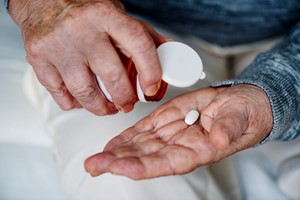Medical experts say the findings from the Boston biotech are encouraging, but that more data are needed.
An experimental drug is offering new hope for a potent painkiller that doesn’t rely on opioids and is non-addictive. Vertex Pharmaceuticals said Thursday that in a pair of Phase 2 clinical trials, its pill significantly reduced acute pain in people recovering from recent surgeries. While the results are encouraging, the Boston company still needs to test the drug in a larger clinical trial ― perhaps later this year ― before seeking approval.
The positive results, which came from two medium-size trials of people recovering from either bunion removals or so-called tummy tucks, are the result of a two-decade effort by Vertex to develop new painkillers. If it is successful, doctors and patients could finally have something stronger than over-the-counter medications without the risks that come with opioids.
“There is an enormous need for novel non-opioid analgesics with no abuse liability,” and Vertex’s results are an “important advance,” said Dr. Clifford J. Woolf, director of the F.M. Kirby Neurobiology Center and Boston Children’s Hospital. It will be important for Vertex to determine whether the drug also works for patients with chronic pain, such as diabetic neuropathy and low back pain, “where the clinical need is highest,” he added.
Vertex compared multiple doses of the drug with placebo pills, in two clinical trials that began last summer. In a study of 274 people recovering from surgical removal of bunions, and in a study of 303 people recovering from tummy tuck surgery, the highest tested dose of Vertex’s drug significantly reduced pain compared with a placebo. But the treatment was not without side effects. Nausea, headaches, and dizziness were relatively common.
The results were announced in a press release. The company hasn’t published clinical or preclinical data on the drug.
Paul Arnstein, a clinical nurse specialist for pain relief at Mass General Hospital, said in an e-mail that the lack of details on how Vertex measured pain reduction over time made it was hard to interpret the data. Vertex also compared its drug’s effectiveness with an opioid and acetaminophen combination, and found that its experimental pill worked better. But Arnstein said that the opioids used in the comparison were given at lower doses and less frequently than what is often used in the hospital.
But despite those uncertainties, Arnstein said, he is “thrilled that this novel analgesic is being studied.” Given efforts to reduce the amount of opioids used, “this would be a welcomed addition to the pain management toolbox,” he said.
Scientists have been trying to develop non-addictive painkillers for many years. A class of pain receptors called voltage-gated sodium channels are an attractive target for researchers. Scientists have found that people with a rare genetic mutation that causes them to lack one of these receptors, called Nav1.7, are not able to feel pain. Studies in animals show that blocking Nav1.7 or a closely related receptor called Nav1.8 can null pain without the addictive properties of opioids, explained Bruce Bean, a neurobiologist at Harvard Medical School.
Dr. David Altshuler, Vertex’s head of global research and chief scientific officer, said drugs that selectively block these receptors are “almost a holy grail of pain research.” Several companies have tested Nav1.7 blockers in a clinical setting, with unexpectedly mediocre results. Vertex’s drug targets the related receptor, Nav1.8, and the company is on track to become the first to test a selective blocker of that pain receptor in an advanced Phase 3 study later this year.
“It is good news,” Bean said of the Vertex results, “especially given the disappointing results from Nav1.7 inhibitors up until now. I would view it as cautiously encouraging.”
Dr. Antje Barreveld, an assistant professor of anesthesiology at Tufts University School of Medicine, said “the sodium channel is an excellent target” for a new treatment. Sodium channel blockers work well as local anesthetics, but their side effects have historically been too great to use them as pills, she added.
This is not the biotech’s first attempt at blocking Nav1.8. The company has tested three other drugs against it. Altschuler said those studies helped show that the pain receptor is a good target for multiple kinds of pain, including acute, neuropathic, and musculoskeletal pain. But those earlier drugs had multiple problems, including more frequent side effects, higher doses, and issues taking the drug with food.
The new drug, which is given at a lower dose than its predecessors, seems to overcome those problems. “There is a high bar for a new pain medicine,” said Paul Negulescu, head of Vertex’s San Diego research labs where the drugs were discovered. “It could be used by millions of people, so it has to be easy to take.”
Dr. Stephen Waxman, a professor of neurology, neurobiology, and pharmacology at Yale University who has studied sodium channels called the trial an “important step forward in providing statistically significant evidence for a clinically meaningful reduction in pain following treatment with a Nav1.8 blocker.” He hopes it will spur more work on sodium channel blockers for other forms of pain, including chronic pain.
Barreveld cautioned that Vertex’s data are based on patient-reported pain scores. She wants to know if people in the trial ended up taking other medications once they finished their course of the Vertex drug. “What we care about clinically is whether patients are able to stay off other medications like opioids and NSAIDs, and how their pain was weeks or months later.”
“Opioids are not bad. They are great for post-surgical pain, but the issue is when they are taken for longer than needed,” she added. “The longer you are on opioids after surgery the more likely you are to get stuck on them. So anything we can do to eliminate post-surgical opioid requirements is excellent and we need that.”













